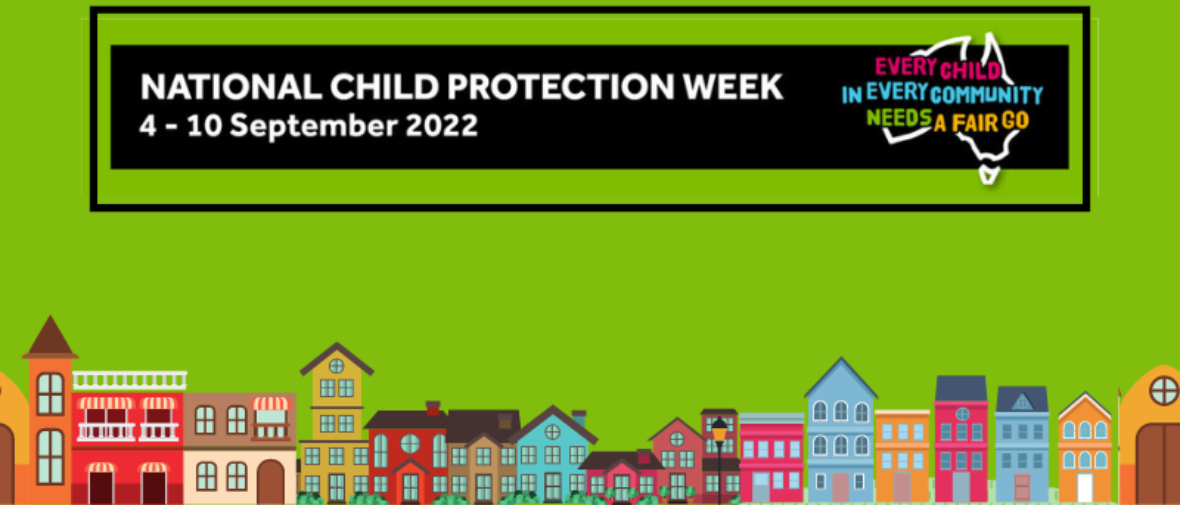
National Child Protection Week, 2022
“Every Child in Every Community Needs a Fair Go”
National Child Protection Week (4-10 September) is an annual event. This year’s theme ‘Every child, in every community, needs a fair go’ aims to spread the message that to treat all of Australia’s children fairly, we need to make sure every family and community has what kids need to grow up safe and supported. (www.napcan.org.au)
At ZOE we have come up with 8 ways that you can help keep children in your community safe.
1. Educate yourself about the signs of child abuse, neglect and exploitation.
Ask yourself, would you know the signs of a child experiencing violence, neglect or abuse? Could you recognise behaviours associated with child sexual abuse such as grooming - whether it be online or in person? For anyone who has contact with children, it is important to be able to know the signs in order to recognise any one of these issues, if you see it.
It’s common to think that child abuse or exploitation is only perpetrated by a weird or scary stranger. However, research shows that children are mostly abused by someone they know (a relative, family friend, teacher, coach or community member) and it is often someone they trust.
Child sexual abuse does not discriminate. It happens in all cultures and in all sorts of families. Both girls and boys, of any age, are at risk.
2. (Parents) Talk with your children.
Not once. Not twice. All the time! Make it a natural and normal occurrence to chat about staying safe. Just like you are continually reinforcing to them how to stay on the road, near a fire, around water, and on the internet; make ‘staying safe’ from sexual abuse and exploitation just as much a part of your everyday conversations.
Sadly, these issues are more common than you may think. The ACCCE received more than 36,000 reports of child sexual exploitation in the 2021-22 financial year. (https://www.accce.gov.au/resources/research-and-statistics)
And these are just the ones that were reported!
3. Raise awareness in your community.
We all have a responsibility to look out for the children in our community and speak up when we see behaviour that suggests a child could be unsafe. We must not ignore our concerns or red flags. There are many types of child abuse and neglect, but the six main subtypes are:
- physical child abuse
- emotional child abuse
- neglect
- child sexual abuse
- exposure to family violence
- grooming
Some instances of child abuse will fall across multiple categories. For instance, family violence may involve physical, sexual, and/or emotional child abuse (www.education.vic.gov.au/)
4. Support organisations that help.
There are many Australian organisations that are working towards keeping children safe. By supporting them, you are helping to strengthen their efforts. Support might look like sharing their resources, promoting them on your social media, engaging a speaker to come and share at your school, workplace or sports club, talking to others about the services they provide, or giving to them financially to enable them to continue their services.
5. Monitor your children's internet usage.
Internet safety is a whole topic in and of itself, but again, just like you make it your job to get to know your children’s friends and community in real life, so too is it essential to know who your children are interacting with online. By being engaged and interested in what they’re doing on social media, in their games and chats, you are in a much better position to notice if something rings an alarm bell. Keep the line of communication open and let them know that nothing is too bad or serious to talk about and that they will not be in trouble by reporting to you if something doesn’t feel right.
6. Recognise the complexities faced by vulnerable children.
One group of children who are considered vulnerable are those in foster care. During 2020–21, more than 178,800 Australian children received child protection services. In June 2021, more than 46,200 children were in out-of-home care. (https://www.aihw.gov.au/reports/child-protection/child-protection-australia-2020-21/contents/about)
Children in out-of-home care are already considered a “vulnerable population” who face additional medical, psychological, and social risks. A safe community is necessary to protect them from further harm and support them according to their immediate and future needs. Maybe you don’t feel cut out to be a foster carer yourself but what about offering other support to a family who is already helping a child in care? Sometimes just cooking a meal, delivering groceries, assisting with homework or helping tidy up their yard makes the world of difference!
7. Share what you learn with others.
We can never raise too much awareness or overly discuss these issues. Do the people in your circle of influence know what you know about the signs of child abuse, neglect and exploitation? If not, how can you start having conversations with them? What about your mother’s group, book club, church friends, sports club or relatives? The more people who are informed, the more our communities can become supportive and safe environments for children to live in.
8. Report any concerning behaviour to authorities.
“If physical or behavioural indicators lead you to suspect that a child has or is being abused, or is at risk of abuse, regardless of the type of abuse, you must respond as soon as practicable” (www.education.vic.gov.au/school/teachers/health/childprotection)
“There is no information too small or insignificant. Something that may appear small or insignificant could prove vital to a police investigation.” www.accce.gov.au/report
If you’re a parent seeking to know and understand more about the topics covered in this blog, please reach out to us so that we can help direct you to more resources or plan for a parenting/ community information session to help facilitate questions/concerns as well as further training on these topics. info@gozoe.org.au
Published by: Andrea Cross in Awareness, Blog, Education, Restoration
Tags: child protection, grooming, parents, safety